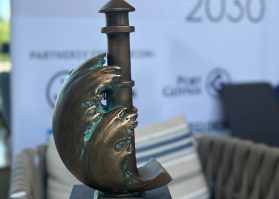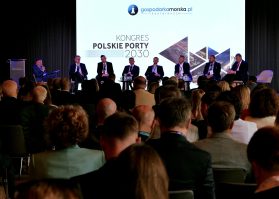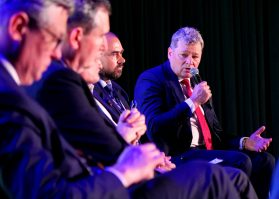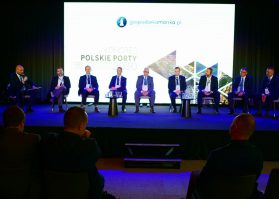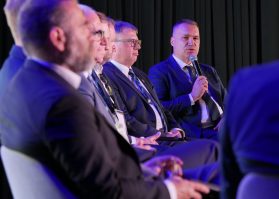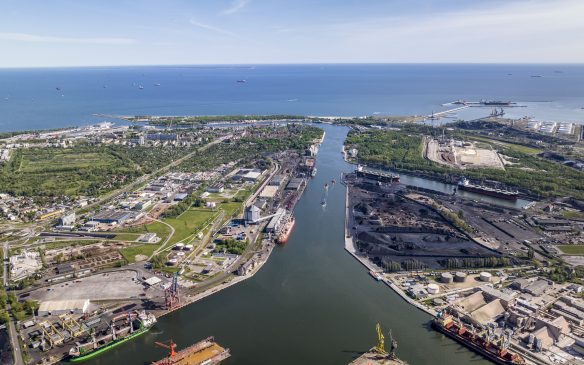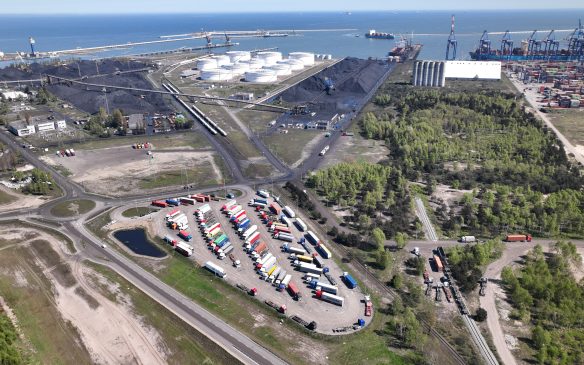The first Polish conference focused entirely on the port industry took place in Sopot on 1 and 2 June

What will 2030 bring? Polish ports will surely look completely different 7 years from now, regardless of any political and economic changes. Together with the rest of the world, they will enter the path of ecology and digitisation. Polish ports – both those with strategic significance to the Polish economy and their smaller cousins, are faced with a huge opportunity. That opportunity was the topic of discussion for experts and practitioners attending Kongres Polskie Porty 2030. The attendees discussed the problems we will have to face in the near future, as well as possible avenues for development.
Strategic Flows
The conference was opened by Dr Jacek Bartosiak, founder and owner of the Strategy&Future geopolitics and geostrategy think-tank, whose lectures enjoy great popularity. ‘The seas are the most convenient and cheapest roads for the flow of goods, and thus for strategic flows. The mechanisms of partnerships between states, the tensions between them and their alliances, are determined by the rules governing the flow of people, goods, as well as ideas, money and technologies. Seaports are at the centre of this. He who makes the rules governing strategic flows has control over his own fate,’ Bartosiak said.
Seaports have been among the most rapidly developing sectors of the Polish economy in recent years. This growth is best presented using numbers. In 2012, Polish ports handled a total of 63.974 million tonnes of goods, a result that more than doubled in 2022, with their handling volume reaching 133.2 million tonnes. The largest Polish port, the Port of Gdańsk, was responsible for 68.2 million tonnes, or 51% of all goods. This also made it the leading container port in the Baltic area.
The first panel discussion focused on port development and expansion. Its participants included Adam Kłos, director of the commercial department at the Port of Gdańsk. He discussed various projects being worked on by the Port of Gdańsk Authority, as well as certain external companies such as PKP PLK. In addition, he stressed the role of port operators.
‘Our goal is to be among the top ten European ports, and to be the top port in the Baltic region. This strategy requires choosing the right tools. Our development plans focus on the waters of the Bay of Gdańsk. We have issued a new request for land development offers and are waiting for a binding offer from a potential investor who will build a new terminal and become an operator in the bay. It is time to call business a bet,’ he explained during the discussion.
Another panel on the new role of ports in ensuring energy security was attended by Sławomir Michalewski, vice president of the Port of Gdańsk. He stressed that, even though it may appear that ports focus on competing on handling volume, the main challenge they are facing is not competition, but ensuring energy security. ‘In 2021, 45% of our handling volume was energy resources. A year later, they constituted 60%,’ he said. ‘If more deliveries are needed, we can handle them, but where do we go from there? Poland plays a leading role in this part of Europe. We are doing well for ourselves, but we need to be pragmatic and future-oriented.’
The first day ended with an official gala and an award ceremony for the Maritime Economy Lighthouses contest. On behalf of the Port of Gdańsk, the award for record volume and advancing in European rankings in 2022 was received by Kamil Tarczewski, vice president of the Port of Gdańsk Authority.
On the second day, Dr Radosław Hołda, plenipotentiary for security at the Port of Gdańsk, participated in a panel discussion on current threats, including cybersecurity and dual-use infrastructure. Piotr Bura, director of the Marketing and Communications Department, talked about such issues as the job market within the context of seaport development.
The event was held under the honorary patronage of the Ministry of Infrastructure. The conference was organised by the GospodarkaMorska.pl website. The Port of Gdańsk was a strategic partner of the event.

